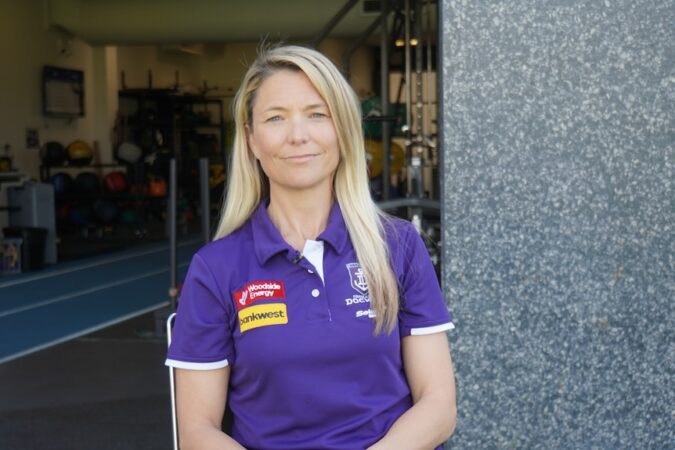
When Winnie walks into a room, she’s greeted by a wave of adoration.
Key points:
- Angie Bain is the Fremantle Dockers’ head of wellbeing
- She brings her dog, Winnie, to the club four days a week
- She says the groodle is having a great impact on player mental health
It’s not because she’s the most popular person at the Fremantle Dockers, or the best player, or the most important figure in the club.
It’s because she’s a groodle — a cross between a golden retriever and a poodle.
Winnie is five months old and belongs to the Dockers’ Head of Wellbeing, Angie Bain.
She comes into the club four days a week, and has already made a big impact.
“You will actually see the body language that people use with her, to help you start a conversation with them,” Bain said.
“It’s interesting how much more people talk when there’s a dog involved in the conversation.
“I’ve actually been pleasantly surprised at how much she’s been welcomed, integrated and how naturally she’s actually just taken to the role.”
Bain has been at Fremantle full-time since November, and is part of a different approach to managing both mental health and the general wellbeing of players and staff.
The shift has been away from supporting the players at the expense of other staff, to a more holistic program focused on the club as a whole.
“It’s not just looking at the performance element of our two teams, our men’s and our women’s, but it’s actually starting to embrace wellbeing in the environment of all of our people,” Bain said.
One high pressure environment to another
Joanne Cregg is a mature-age draftee to the Dockers AFLW program, and is also an emergency department doctor at Perth Children’s Hospital.
She’s balancing two high-pressure environments, and benefits from the service provided by Bain and Winnie, as well as player development manager Claire Heffernan.
“Where I work has a high stress level associated with it. And then when you come to train, you’re always trying to be at your peak performance,” Cregg said.
“I’ve never been able to be a person that can just leave my work at work.”
Cregg said the ability for the wellbeing team to gently enquire about things outside of football helps remove barriers to conversation.
“Sometimes if you’ve had a really tough few days there, and you’ve had some cases that maybe didn’t go well, to be able to come to training and be able to have people that can acknowledge within you that you’re just not yourself, and there’s something else going on… is incredible,” she said.
“It’s so valuable to have that support around us. I think at the end of the day, you know, we are elite athletes, and physical performance is part of that, but it’s only a small part.
“At the end of the day, we’re human beings.”
Changing attitudes towards mental health
Mental health has become a key focus for elite sporting organisations, with increased recognition of the impact it can have on performance.
It’s a marked change in the attitude to mental health of previous eras.
“I’d say the attitude 20 years ago is that … mental health, mental fitness was misunderstood,” Bain said.
“I think if you did have challenges from a psychological point of view, it was often disguised as an injury, or need a timeout from the game, or my work is now taking preference.
“So I think we lost a lot of people that didn’t get the services and the support they needed because of a gap in understanding about what mental health is and how it presents.
“It wasn’t spoken about, so therefore it wasn’t there.”
The AFL launched a mental health and wellbeing strategy in 2020, which referenced a 2015 study that found one in five players experienced mental health problems at a level that warranted treatment.
But while 20 per cent of players would experience issues, 10 per cent of players said they wouldn’t seek help.
Bain said mental wellbeing was becoming a priority across the industry, and in elite sport generally.
“The fundamental mental health basic training that people need is just a non-negotiable in my perspective,” she said.
“But it’s certainly been a slow burn. It hasn’t happened quickly and we’ve still got a way to go.”
Removing the stigma
Numerous senior players have spoken openly about their battles with mental health, including former Fremantle captain and dual-Brownlow Medallist Nat Fyfe.
Bain believes the more comfortable players are dealing with their mental health, the more openly they will talk about it.
“When we’ve got high-profile players speaking up about mental health, it’s just normalising that,” she said.
“I think the stigma is changing.
“But we need ambassadors, we need champions of change, to help continually put the conversation out there.”
A core part of Bain’s role is helping younger players who come into an environment where winning is the metric by which the wider community judges them.
“People are coming into a high-performing environment, which is very different to a school environment, very different to a community environment in terms of expectations, standards, compliance,” she said.
“We see, particularly in the first few years, the amounts of highs and lows are very, very frequent.
“Depending upon injury, form, selection, their sense of safety and belonging in the environment, and then, outside of footy, their relationships, their financial health, their spiritual health, their connection to community — it all plays into the holistic side of the wellbeing.”
Source: AFL NEWS ABC



